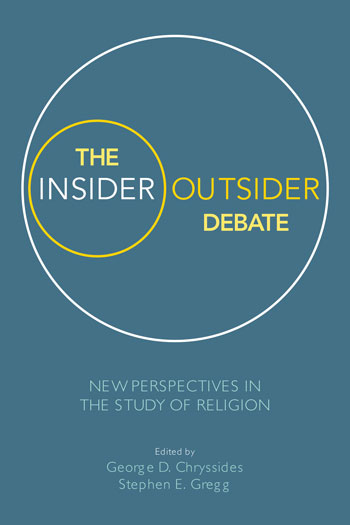The Insider/Outsider Debate
A specialist book which must get beyond the specialists as it speaks into prejudice, inter-faith issues and basic hospitality
 The Insider/Outsider Debate. New Perspectives in the Study of Religion
The Insider/Outsider Debate. New Perspectives in the Study of Religion
Chryssides, George D & Stephen E Gregg (eds)
Equinox, Sheffield, 2019,
ISBN: 9781781793442
Reviewed by Alec Gilmore
The world shrinks. Population movements increase. Companies, organisations and long-standing institutions merge or re-invent themselves. Constantly we find ourselves bumping into people and situations we have never met before. Personal relationships have never been more important. Who to trust? When to be wary? The Insider/Outsider concept is a longstanding handy rule of thumb but when a group of specialists took a closer look they soon came to the conclusion that such a binary approach was a glorious over-simplification. As with 'black and white', there are countless shades of grey, or 'edges of inside' (as one contributor prefers to describe them), each with its own fluidity.
Definitions, for a start, are mostly non-existent. Lines of Demarcation (if they ever existed) are lost in time, and where they survive, perceptions vary enormously. After deep and widespread explorations they came up with a substantial book (20 essays by 20 specialists) which has to be welcomed. Potential boiling points are legion; race, colour, immigration, gender, education, class and culture. Even confining themselves to religion saw a curve from religion per se to Christianity (western, eastern, asian, long established denominations and more recent arrivals) followed by Theosophy, Scientology and the New Age Movement.
For example, are those who claim to be 'spiritual but not religious', or ‘believe but don’t belong’, in or out? Are 'insiders from birth’ different from ‘converts’, or those who 'do theology for the church’ in and those with a wider agenda out? Then there are the ‘switchers’, some changing their allegiance more than once, or the victims of fluidity in fashion such as Roman Catholics Pre- and Post-Vatican 2, or (come to that) simply ‘Christian’ and ‘Non-Christian’ since Christianity has no clear, universally agreed defining line. Beyond that come other religions and social, political and cultural groupings closely allied to religion.
After exploring all aspects, eschewing all easy answers and with no pretence to offer solutions, Chryssides and his colleagues arrive at an alternative more complex framework of religious identity in the form of a series of Concentric Circles, carefully identifying the territory to be worked and supplying resources for action.
Two caveats. One, such a specialist book may not readily get beyond the specialists. It must. These are not specialist issues. They have consequences for every living being.
The other, hopefully its overwhelming comprehensiveness will not put readers off. These are issues that everybody can understand, most people would regard them as important for healthy community life, and nobody has to make the whole journey; exploring foothills can often be more rewarding than achieving peaks. There are easy first steps and one or two sparks could fuel beacons of prayer across the country. Organisers of study groups or conferences touching on prejudice, inter-faith issues or simply basic hospitality, and seeking ways of working together should not overlook it.
Alec Gilmore is a Baptist minister
Baptist Times, 15/01/2020